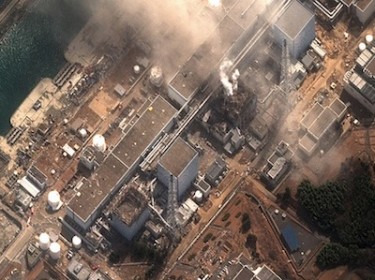 |
| Fukushima Daiichi Before the 9.0 earthquake and tsunami on 3/11/11. |
First of all, I'm sure the thing that most people care about right now is the situation at the Japanese power plant Fukushima Daiichi. Now, I try not to get too much into politics because that is an environment (pun haha!) that I don't think I could pull my weight in, but I realize that my blog will move into hot-topic territory now and again and I'm going to be forced to address these problems from a position that's more political.
I guess this means that I'm going to have to get some things straight so as not to confuse my audience. I am, if it weren't obvious already, far more liberal on a lot of issues, maybe even most issues, and certainly on issues concerning the health of people and the environment. However, I realize that overly "liberal" people are just as bad as the "conservative" people they oppose, so I will try to at least be open to both sides of the argument.
 |
| Damage to Fukushima Daiichi after the earthquake and tsunami on 3/11/11. |
Ok so...Fukushima Daiichi.A lot of media sites seem to be blowing it out of proportion and there are all kinds of conflicting reports. From a practical standpoint, I want to say that the situation has gone a lot better than it could have for the power plant going through a 9.0 earthquake and a tsunami.
Here are a few articles that describe the nuclear situation as "better than it could've been":
1). http://tech.mit.edu/V131/N13/yost.html says:
"From the information we have, we can draw a conclusion anywhere between “the reactor is undamaged and being cooled” to “the reactor cladding and/or fuel has been partially damaged, but the damage is contained and the reactor is being cooled.” The question that should be asked now is whether the reactor has any future value as an electricity-producing asset. The widely-hyped possibility of some Chernobyl-like event is inconceivable without a new, catastrophic disaster. Coolant flow has been re-established and the public is in no danger. Given the magnitude of the precipitating event — a 9.0 earthquake — and the vast property damage it caused, the events at Fukushima are not a serious reason to re-evaluate our own nuclear policy in the United States."
An interesting thing I learned from this article is that the parts that blew off in the explosions in reactor 1 and 3 were the fourth "layer" of protection which was a drywall building not intended to actually contain anything. It seems like its job was to protect the workers from weather as they work around the containment vessel. So that means that the steel-and-concrete buildings could still be intact (the third layer of protection) and the steel container also (the second layer).
2). And http://www.theregister.co.uk/2011/03/14/fukushiima_analysis/page3.html:
"Radiation health effects have been pretty much zero. At times there have been heightened radiation levels inside the plants from short-life isotopes in the steam releases – sometimes enough that an unprotected person next to a reactor building might have sustained a year's normal dose from background radiation in an hour. This is not particularly terrifying, really – nobody is scared at the prospect of living another year on planet Earth – but it is being reported under scaremongering headlines. Another thing the weekend reporters have missed was the fact that all but tiny traces of the airborne radionuclides (from the salt in the seawater coolant) were disappearing before they could even cross the street; there is essentially no health hazard to people living nearby. Precautionary evacuations and tests were just that: precautionary."
3). The BBC is also saying about the same thing as these two articles above so at this point I'm still feeling confident in nuclear technology.
 |
| Reactor 1 after the explosion 3/12/11. |


